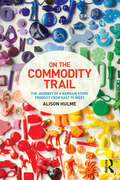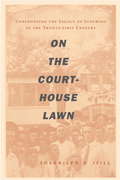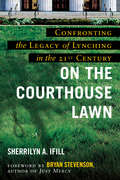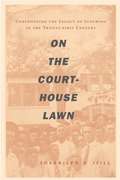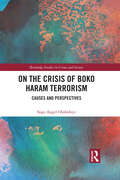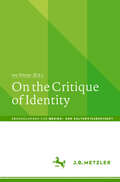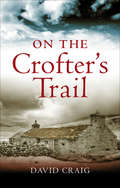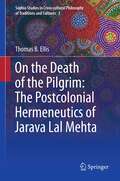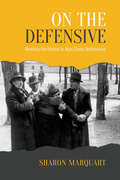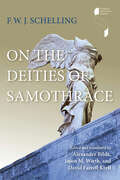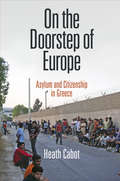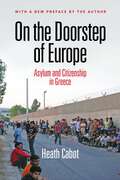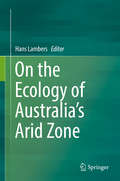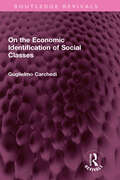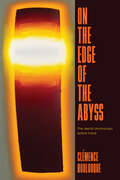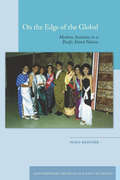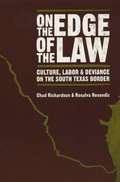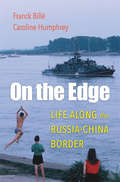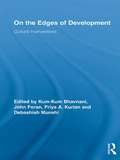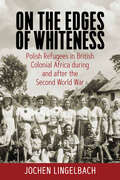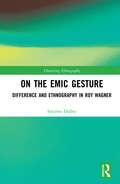- Table View
- List View
On the Commodity Trail: The Journey of a Bargain Store Product from East to West (Criminal Practice Ser.)
by Alison HulmeFollowing the journey of eight bargain store objects, Alison Hulme reveals the complex story behind society’s simplest and cheapest commodities. Inspired by Walter Benjamin’s Arcades Project, On the Commodity Trail explores the colourful and fascinating histories of everyday objects.Along the way, we observe raw materials on municipal rubbish dumps in China, newly re-made products in the world’s largest wholesale market, and take a journey across the seas, to bargain stores in Europe and North America, arriving finally in the homes of consumers. Weaving together narratives from the people we meet at different parts of the commodity chain – waste peddlers, wholesalers, store owners, and shoppers – the book examines the places and people at the heart of these localized yet immense global networks.Unlike other investigations of commodity chains, this study does not chart a straightforward trajectory from production to consumption. Instead, it demonstrates that the low-end commodity chain is one of constant rupture in which products are made and re-made, blurring the dividing line between producing and consuming.An ethnography of material culture as well as an examination of commodity culture at a time of economic downturn, this deeply-engrossing book makes a unique contribution to our understanding of commodity chains and consumer culture.
On the Corner
by Daniel MatlinIn July 1964, after a decade of intense media focus on civil rights protest in the Jim Crow South, a riot in Harlem abruptly shifted attention to the urban crisis embroiling America's northern cities. On the Corner revisits the volatile moment when African American intellectuals were thrust into the spotlight as indigenous interpreters of black urban life to white America, and examines how three figures--Kenneth B. Clark, Amiri Baraka, and Romare Bearden--wrestled with the opportunities and dilemmas their heightened public statures entailed. Daniel Matlin locates in the 1960s a new dynamic that has continued to shape African American intellectual practice to the present day, as black urban communities became the chief objects of black intellectuals' perceived social obligations. Black scholars and artists offered sharply contrasting representations of black urban life and vied to establish their authority as indigenous interpreters. As a psychologist, Clark placed his faith in the ability of the social sciences to diagnose the damage caused by racism and poverty. Baraka sought to channel black fury and violence into essays, poems, and plays. Meanwhile, Bearden wished his collages to contest portrayals of black urban life as dominated by misery, anger, and dysfunction. In time, each of these figures concluded that their role as interpreters for white America placed dangerous constraints on black intellectual practice. The condition of entry into the public sphere for African American intellectuals in the post-civil rights era has been confinement to what Clark called "the topic that is reserved for blacks. "
On the Courthouse Lawn
by Sherrilyn IfillNearly 5,000 black Americans were lynched between 1890 and 1960. Over forty years later, Sherrilyn Ifill's On the Courthouse Lawn examines the numerous ways that this racial trauma still resounds across the United States. While the lynchings and their immediate aftermath were devastating, the little-known contemporary consequences, such as the marginalization of political and economic development for black Americans, are equally pernicious. On the Courthouse Lawn investigates how the lynchings implicated average white citizens, some of whom actively participated in the violence while many others witnessed the lynchings but did nothing to stop them. Ifill observes that this history of complicity has become embedded in the social and cultural fabric of local communities, who either supported, condoned, or ignored the violence. She traces the lingering effects of two lynchings in Maryland to illustrate how ubiquitous this history is and issues a clarion call for American communities with histories of racial violence to be proactive in facing this legacy today. Inspired by South Africa's Truth and Reconciliation Commission, as well as by techniques of restorative justice, Ifill provides concrete ideas to help communities heal, including placing gravestones on the unmarked burial sites of lynching victims, issuing public apologies, establishing mandatory school programs on the local history of lynching, financially compensating those whose family homes or businesses were destroyed in the aftermath of lynching, and creating commemorative public spaces. Because the contemporary effects of racial violence are experienced most intensely in local communities, Ifill argues that reconciliation and reparation efforts must also be locally based in order to bring both black and white Americans together in an efficacious dialogue. A landmark book, On the Courthouse Lawn is a much-needed and urgent road map for communities finally confronting lynching's long shadow by embracing pragmatic reconciliation and reparation efforts.
On the Courthouse Lawn, Revised Edition: Confronting the Legacy of Lynching in the Twenty-First Century
by Sherrilyn A. Ifill Bryan StevensonRevised edition of the groundbreaking book on the effects of lynching in the U.S. featuring a foreword from Bryan StevensonNearly 5,000 black Americans were lynched between 1890 and 1960, and, as Sherrilyn Ifill argues, the effects of this racial trauma continue to resound. In On the Courthouse Lawn Ifill, President and Director-Counsel of the NAACP Legal Defense and Educational Fund, issues a clarion call for American communities with histories of racial violence to be proactive in facing this legacy. Inspired by South Africa's Truth and Reconciliation Commission, and drawing on techniques of restorative justice, she offers concrete ways for communities to heal. Featuring a new afterword from the author and a new foreword from Bryan Stevenson, this revised edition will help readers to navigate and better understand contemporary struggles to come to terms with the legacy of racial terror in the United States including debates about the National Anthem and Civil War monuments.
On the Courthouse Lawn: Confronting the Legacy of Lynching in the Twenty-first Century
by Sherrilyn A. IfillAs her clients explain the background to the injustice they were seeking relief from, says civil rights lawyer Ifill (law, U. of Maryland), lynching inevitably comes into the story. She found that communities have no formal mechanisms to help blacks and whites come to terms with the legacy of lynching. Here she offers the bare beginning of a project analogous to the South African Truth and Reconciliation Commission, with the painful but necessary names and details of lynchings during the 20th century, not as a catalogue, but in chapters looking at various aspects. Annotation ©2007 Book News, Inc. , Portland, OR (booknews. com)
On the Crisis of Boko Haram Terrorism: Causes and Perspectives (Routledge Studies in Crime and Society)
by Sogo Angel OlofinbiyiThe book provides a pentapartite theoretical analysis of socio-economic factors as the grand basis for the evolution of Boko Haram terrorism in Nigeria. It describes the terrorism as a by-product of unresolved conflict emanating from unequal hegemonic power exchange with respect to the non-fulfillment of socio-economic goals between the political state and the citizenry. Rather than follow the popular notion of religion as the root causes of Boko Haram crisis, the book widens its scope to cover terrorism as a whole with a view to laying a more viable foundation for its readers to understand the concept of terrorism, provoking causes and perspectives, as well as influential factors that may interplay to sustain extremist terrorism in contemporary global society. Using Boko Haram as a potentially useful model, the book contends that the discursive framework of terrorism cannot be isolated from its socio-economic perspectives. In view of the foregoing, the simplistic response to resolving terrorism crisis in Nigeria still lies at the heart of ameliorating the socio-economic conditions of the citizens via the political state. The book will be appropriate for individuals whose interests are vested on terrorism and homeland security, terrorism and counterterrorism studies, criminal justice and organized crime, terrorism and political violence, African politics, peace and conflict resolution as well as security and conflict management. Counter-terrorism experts, policy makers, academic scholars, intelligence and security operatives will also find this book resourceful. Ultimately, as interest in terrorism studies continues to grow exponentially among Sociologists, Anthropologists and Criminologists, it is my utmost quest to provide the most invaluable themes and updated theories in terrorism research for use by independent researchers, students and academics seeking to advance empirically and theoretically driven research in the fields of terrorism, homeland security and related crimes.
On the Critique of Identity (Abhandlungen zur Medien- und Kulturwissenschaft)
by Ivo RitzerWith the rise of ‘identity politics’ both in right-wing extremism as well as in activist academia, arts and feuilleton, major differences between the traditional left and the right have become blurred. This book addresses the ideological shifts from a vantage point of critical theory, psychoanalysis, as well as Marxist interventions. Discussed are prevailing ideologies of identitarianism, putting the latter into social and historical, as well as philosophical and epistemological context. The chapters offer theoretical elaborations on the myriad connections of identitarianism and counter-enlightenment, analyzing in particular the role of ethnocentric populism, antisemitism, as well as conformist and conservative rebellion.
On the Crofter's Trail: In Search Of The Clearance Highlanders
by David CraigTracing the legacies of the small farmers displaced and scattered in nineteenth-century Scotland, this is &“a powerful, poetic, personal Highland Odyssey&” (Times Literary Supplement). In the Clearances of the nineteenth century, crofts—once the mainstay of Highland life in Scotland—were swept away as the land was put over to sheep grazing. Many of the people of the Highlands and islands of Scotland were forced from their homes by landowners in the Clearances. Some fled to Nova Scotia and beyond. In this book, David Craig sets out to discover how many of their stories survive in the memories of their descendants. He travels through twenty-one islands in Scotland and Canada, many thousands of miles of moor and glen, and presents the words of men and women of both countries as they recount the suffering of their forebears. &“[David] has the eye, the imagination and the descriptive density of early Bruce Chatwin.&” —Toronto Globe & Mail
On the Death of the Pilgrim: The Postcolonial Hermeneutics of Jarava Lal Mehta
by Thomas B. EllisThis searching examination of the life and philosophy of the twentieth-century Indian intellectual Jarava Lal Mehta details, among other things, his engagement with the oeuvres of Martin Heidegger, Hans-Georg Gadamer, and Jacques Derrida. It shows how Mehta's sense of cross-cultural philosophy and religious thought were affected by these engagements, and maps the two key contributions Mehta made to the sum of human ideas. First, Mehta outlined what the author dubs a 'postcolonial hermeneutics' that uses the 'ethnotrope' of the pilgrim to challenge the philosophical hermeneutic emphasis on supplementation and augmentation. For Mehta, the hermeneutic encounter ruptures, rather than supplements, the self. Secondly, Mehta extended this concept of hermeneutics to interrogate the Hindu tradition, arriving at the concept of the 'negative messianic'. In contrast to Derrida's emphasis on the 'one to come', Mehta shows how the Hindu bhakti model represents the very opposite, that is, the 'withdrawn other,' identifying thereby the ethical pitfalls of deconstructivism's emphasis on the messianic tradition. This is the only full-length study in English of this high-profile Hindu philosopher.
On the Defensive
by Sharon MarquartOn the Defensive considers how our ethical responses to the Nazi camps have unintentionally repressed and denied the experiences of their victims. Through detailed readings of survivor narratives, particularly the works of political deportees Jorge Semprun and Charlotte Delbo, Sharon Marquart examines how well-intentioned people - including victims, their family members, and readers of witness literature - respond to such testimony in ways that are understood as ethical by their communities but serve instead to ignore victims' experiences.As Marquart shows, collective disasters such as the Holocaust expose the limitations of our ethical theories. To cope with this instability we withdraw and defend ourselves through inattentive and formulaic responses that turn a blind eye to the plight of victims. Challenging contemporary theorizations of community, ethics, testimony, and trauma, On the Defensive is a far-reaching reflection on the ways in which communal understandings of our duties and responsibilities to others can facilitate the denial of an atrocity's horrors.
On the Deities of Samothrace (Studies in Continental Thought)
by F. W. SchellingIn 1815, F. W. J. Schelling presented a lecture titled "On the Deities of Samothrace" to the Bavarian Academy of Sciences. The lecture offered a startlingly original reading of the ancient Greek mystery religion on the island of Samothrace. It would be the last book Schelling himself published, and it is the key to his influential Philosophy of Mythology. Now, for the first time in English, this critical edition contains the entirety of Schelling's original text, including the lecture itself, Schelling's afterword, and all his extensive philosophical and philological endnotes. It also offers copious explanatory notes, photographs and maps of the site, and three interpretive essays by the editors and translators elucidating Schelling's text for contemporary readers. On the Deities of Samothrace is one of Schelling's most original and exciting works. It is a signature text in Schelling's thought and in the philosophy of religion generally.
On the Digital Humanities: Essays and Provocations
by Stephen RamsayA witty and incisive exploration of the philosophical conundrums that animate the digital humanities Since its inception, the digital humanities has been repeatedly attacked as a threat to the humanities: warnings from literary and cultural theorists of technology overtaking English departments and the mechanization of teaching have peppered popular media. Stephen Ramsay&’s On the Digital Humanities, a collection of essays spanning the personal to the polemic, is a spirited defense of the field of digital humanities. A founding figure in what was once known as &“humanities computing,&” Ramsay has a well-known and contentious relationship with what is now called the digital humanities (DH). Here Ramsay collects and updates his most influential and notorious essays and speeches from the past fifteen years, considering DH from an array of practical and theoretical perspectives. The essays pursue a broad variety of themes, including the nature of data and its place in more conventional notions of text and interpretation, the relationship between the constraints of computation and the more open-ended nature of the humanities, the positioning of practical skills and infrastructures in both research and pedagogical contexts, the status of DH as a program for political and social action, and personal reflections on the author&’s journey into the field as both a theorist and a technologist. These wide-ranging essays all center around one idea: that DH not forsake its connection to the humanities. While &“digital humanities&” may sound like an entirely new form of engagement with the artifacts of human culture, Ramsay argues that the field well reveals what is most essential to humanistic inquiry.
On the Doorstep of Europe: Asylum and Citizenship in Greece (The Ethnography of Political Violence)
by Heath CabotGreece has shouldered a heavy burden in the global economic crisis, struggling with political and financial insecurity. Greece has also the most porous external border of the European Union, tasked with ensuring that the EU's boundaries are both "secure and humanitarian" and hosting enormous numbers of migrants and asylum seekers who arrive by land and sea. The recent leadership and fiscal crises have led to a breakdown of legal entitlements for both Greek citizens and those seeking refuge within the country's borders.On the Doorstep of Europe is an ethnographic study of the asylum system in Greece, tracing the ways asylum seekers, bureaucrats, and service providers attempt to navigate the dilemmas of governance, ethics, knowledge, and sociability that emerge through this legal process. Centering on the work of an asylum advocacy NGO in Athens, Heath Cabot explores how workers and clients grapple with predicaments endemic to Europeanization and rights-based protection. Drawing inspiration from classical Greek tragedy to highlight both the transformative potential and the violence of law, Cabot charts the structural violence effected through European governance, rights frameworks, and humanitarian intervention while also exploring how Athenian society is being remade from the inside out. She shows how, in contemporary Greece, relationships between insiders and outsiders are radically reconfigured through legal, political, and economic crises.In addition to providing a textured, on-the-ground account of the fraught context of asylum and immigration in Europe's borderlands, On the Doorstep of Europe highlights the unpredictable and transformative ways in which those in host nations navigate legal and political violence, even in contexts of inexorable duress and inequality.
On the Doorstep of Europe: Asylum and Citizenship in Greece (The Ethnography of Political Violence)
by Heath CabotSince the global financial crisis of 2008, Greece has shouldered a heavy burden struggling with internal political and financial insecurity as well as hosting enormous numbers of migrants and asylum seekers who arrive by land and sea. In On the Doorstep of Europe, Heath Cabot presents an ethnographic study of the asylum system in Greece, tracing the ways asylum seekers, bureaucrats, and service providers attempt to navigate the dilemmas of governance, ethics, knowledge, and social relations that emerge through this legal process. Centering on the work of an asylum advocacy NGO in Athens, Cabot explores how workers and clients grapple with predicaments endemic to Europeanization and rights-based protection. Drawing inspiration from classical Greek tragedy to highlight both the transformative potential and violence of law, Cabot charts the structural violence effected through European governance, rights frameworks, and humanitarian intervention while also exploring how Greek society is being remade from the inside out. She shows how, in contemporary Greece, relationships between insiders and outsiders are radically reconfigured through legal, political, and economic crises.Now updated with a preface reflecting on the critical stakes of the book’s exploration of refuge in light of events that have transpired in and beyond Europe since its initial publication, On the Doorstep of Europe highlights how border crossers and residents in countries of arrival navigate legal and political violence. Cabot’s on-the-ground account of asylum and immigration in Europe’s borderlands, based on fieldwork conducted between 2004 and 2011, shows how the difficulties encountered by asylum seekers in an earlier time remain relevant and revealing in the face of ongoing crises and challenges today.
On the Ecology of Australia’s Arid Zone
by Hans LambersThis book will appeal to an international audience as well as be irresistible to local readers. Anyone working or with an interest in Australia’s arid zone should need ready access to this book. There is no equivalent publication out there at the moment, and this book has many authoritative chapters, richly illustrated with colourful material.The challenge of this book was to assemble current knowledge on particular topics and concepts, and principles relating to them. It is also forward-looking by identifying where there are gaps or inadequacies in knowledge, and where future research needs to be directed. Lead authors were encouraged to take such an approach; they had the opportunity to involve any author they considered appropriate. The final product shouldbe a fabulous resource, also for university courses, especially at MSc level.
On the Economic Identification of Social Classes (Routledge Revivals)
by Guglielmo CarchediFirst published in 1977, On the Economic Identification of Social Classes centres around the economic identification – the definition in terms of production relations – of social classes, focussing on the developed capitalist countries. The basic stages of capitalist development are considered, with special emphasis on monopoly capitalism. The book includes a detailed analysis of the functional element of the capitalist production relations; the identification, in terms of production and distribution relations, of the new middle class under monopoly capitalism; and the analysis of the process of proletarianism of this class. New theoretical concepts – of position, devaluation of labour power through dequalification of positions, and of capitalist and non-capitalist state activities – are developed to further the discussions, which, although fresh in approach, are immersed in the complex texture of Marxist thought. This book will be of interest to students of economics and sociology.
On the Edge of Empire
by Adele Perry"On the Edge of Empire" is a well-written, carefully researched, and persuasively argued book that delineates the centrality of race and gender in the making of colonial and national identities, and in the re-writing of Canadian history as colonial history. Utilising feminist and post-colonial filters, Perry designs a case study of British Columbia. She draws on current work which aims to close the distance between 'home' and away in order to make her case about the commonalities and differences between circumstances in British Columbia and the kind of 'Anglo-American' culture that was increasingly dominant in North America, parts of the British Isles, and other white settler colonies."On the Edge of Empire" examines how a loosely connected group of reformers worked to transform an environment that lent itself to two social phenomena: white male homosocial culture and conjugal relationships between First Nations women and settler men. The reformers worked to replace British Columbia's homosocial culture with the practices of respectable, middle-class European masculinity. Others encouraged mixed-race couples to conform to European standards of marriage and discouraged white-Aboriginal unions through moral suasion or the more radical tactic of racially-segregated space. Another reform impetus laboured through immigration and land policy to both build and shape the settler population.A more successful reform effort involved four assisted female immigration efforts, yet the experience of white women in British Columbia only made more pronounced the gap between colonial discourse and colonial experience. In its failure to live up to British expectations, remaining a racially plural resource colony with a unique culture, British Columbia revealed much about the politics of gender, race and the making of colonial society on this edge of empire.Winner of the Clio Award, British Columbia Region, presented by the Canadian Historical Association, and co-winner of the Pacific Coast Branch Book Award, presented by the American Historical Association.
On the Edge of the Abyss: The Jewish Unconscious before Freud
by Clémence BoulouqueA history of the unconscious in public discourse before Freud and its significance for Jewish emancipation. When Sigmund Freud published his theory of the unconscious, in 1899, he popularized an idea that had fascinated generations of Jewish philosophers before him. In this book, Clémence Boulouque charts the development of the pre-Freudian unconscious from subcultural inquiry to dominant discourse during the long nineteenth century. Although Freud’s scientific notion differed from Schelling’s mythical description of the abyss from which creation springs, its resonance with older ideas was celebrated as an opportunity to express specifically Jewish contributions to modernity. Indeed, Boulouque shows that the pre-Freudian unconscious emerged from conversations in Jewish mysticism about otherness and coexistence. In the hopeful years before World War I, Boulouque argues, such reflections offered the possibility of emancipation not only to Jews but to all.
On the Edge of the Globall: Modern Anxieties in a Pacific Island Nation
by Niko BesnierThe global interconnections that the twenty-first-century world is experiencing have raised new questions about agency. Some argue that the destabilization of local truths have given rise to new forms of self-understanding that draw on multiple and ungrounded images. These claims must be scrutinized through an examination of agents' everyday negotiations over the meaning of the local and the global, the modern and the traditional. Through an analysis of vignettes from my ethnographic research in two small-scale societies on the edge of global currents, Tonga (South Pacific) and Tuvalu (Central Pacific), I demonstrate that the crafting of the self constitutes a never-ending and always-contested project, in which performance figures prominently as a resource. I propose a research plan for cultural anthropology at the University of Amsterdam that problematizes modernity by focusing, ethnographically and comparatively, on performance as symbolic and material resources for the formation of subjectivity.
On the Edge of the Law: Culture, Labor, and Deviance on the South Texas Border
by Chad Richardson Rosalva ResendizThe Valley of South Texas is a region of puzzling contradictions. Despite a booming economy fueled by free trade and rapid population growth, the Valley typically experiences high unemployment and low per capita income. <P><P>The region has the highest rate of drug seizures in the United States, yet its violent crime rate is well below national and state averages. The Valley's colonias are home to the poorest residents in the nation, but their rates of home ownership and intact two-parent families are among the highest in the country for low-income residential areas. What explains these apparently irreconcilable facts?
On the Edge: Feeling Precarious in China
by Margaret HillenbrandCharismatic artists recruit desperate migrants for site-specific performance art pieces, often without compensation. Construction workers threaten on camera to jump from the top of a high-rise building if their back wages are not paid. Users of a video and livestreaming app hustle for views by eating excrement or setting off firecrackers on their genitals. In these and many other recent cultural moments, China’s suppressed social strife simmers—or threatens to boil over.On the Edge probes precarity in contemporary China through the lens of the dark and angry cultural forms that chronic uncertainty has generated. Margaret Hillenbrand argues that a vast underclass of Chinese workers exist in “zombie citizenship,” a state of dehumanizing exile from the law and its safeguards. Many others also feel precarious—sensing that they live on a precipice, with the constant fear of falling into this abyss of dispossession, disenfranchisement, and dislocation. Examining the volatile aesthetic forms that embody stifled social tensions and surging anxiety over zombie citizenship, Hillenbrand traces how people use culture to vent taboo feelings of rage, resentment, distrust, and disdain in scenarios rife with cross-class antagonism.On the Edge is highly interdisciplinary, fusing digital media, art history, literary criticism, and performance studies with citizenship, protest, and labor studies. It makes both the distinctive Chinese experience and the vital role of culture central to global understandings of how entrenched insecurity and civic jeopardy fray the bonds of the social contract.
On the Edge: Life along the Russia-China Border
by Caroline Humphrey Franck BilléA pioneering examination of history, current affairs, and daily life along the Russia–China border, one of the world’s least understood and most politically charged frontiers. The border between Russia and China winds for 2,600 miles through rivers, swamps, and vast taiga forests. It’s a thin line of direct engagement, extraordinary contrasts, frequent tension, and occasional war between two of the world’s political giants. Franck Billé and Caroline Humphrey have spent years traveling through and studying this important yet forgotten region. Drawing on pioneering fieldwork, they introduce readers to the lifeways, politics, and history of one of the world’s most consequential and enigmatic borderlands. It is telling that, along a border consisting mainly of rivers, there is not a single operating passenger bridge. Two different worlds have emerged. On the Russian side, in territory seized from China in the nineteenth century, defense is prioritized over the economy, leaving dilapidated villages slumbering amid the forests. For its part, the Chinese side is heavily settled and increasingly prosperous and dynamic. Moscow worries about the imbalance, and both governments discourage citizens from interacting. But as Billé and Humphrey show, cross-border connection is a fact of life, whatever distant authorities say. There are marriages, friendships, and sexual encounters. There are joint businesses and underground deals, including no shortage of smuggling. Meanwhile some indigenous peoples, persecuted on both sides, seek to “revive” their own alternative social groupings that span the border. And Chinese towns make much of their proximity to “Europe,” building giant Russian dolls and replicas of St. Basil’s Cathedral to woo tourists. Surprising and rigorously researched, On the Edge testifies to the rich diversity of an extraordinary world haunted by history and divided by remote political decisions but connected by the ordinary imperatives of daily life.
On the Edges of Development: Cultural Interventions (Routledge Studies in Development and Society)
by John Foran Debashish Munshi Kum-Kum Bhavnani Priya KurianBig business, financial institutions, and capitalist powers have wreaked much havoc on the Third World in the name of development. This book re-imagines development through a careful and imaginative exploration of some of the many ways that culture – in the broadest sense of lived experience and its representation – can recenter resistance, suggest alternative models, and advance critiques of development as it is currently practiced. The diverse group of scholars and activists who contribute chapters to the volume engage with the puzzle of how best to conceptualize an alternative development that improves the living conditions of women and men in different parts of the world and simultaneously demands solutions that focus on the integration of gender, diversity, and development with the realities of people’s lives.
On the Edges of Whiteness: Polish Refugees in British Colonial Africa during and after the Second World War
by Jochen LingelbachFrom 1942 to 1950, nearly twenty thousand Poles found refuge from the horrors of war-torn Europe in camps within Britain’s African colonies, including Uganda, Tanganyika, Kenya and Northern and Southern Rhodesia. On the Edges of Whiteness tells their improbable story, tracing the manifold, complex relationships that developed among refugees, their British administrators, and their African neighbors. While intervening in key historical debates across academic disciplines, this book also gives an accessible and memorable account of survival and dramatic cultural dislocation against the backdrop of global conflict.
On the Emic Gesture: Difference and Ethnography in Roy Wagner (Theorizing Ethnography)
by Iracema H. DulleyRoy Wagner’s work deals with two fundamental issues in anthropology: how to describe difference, and where to place it in anthropological discourse. His discussion and displacement of anthropological concepts such as ‘group’ and ‘culture’ in the 1970s and 1980s have arguably encouraged a deconstructive undertaking in the discipline. Yet Wagner’s work, although part of the radicalizing move of the 1970s and 1980s in anthropology, was until some years ago not a central reference for anthropological theory. The question Dulley asks throughout her engagement with Wagner’s main essays is whether it is possible for the emic gesture to account for difference within difference without falling into the closure of totalization. Wagner’s work contains this potentiality but is hindered by its very foundation: the emic gesture, in which difference is circumscribed through a name that others. If this gesture is one of the pillars of anthropology, and one that allows for the inscription of difference, the reflection proposed in this book concerns anthropology as a whole: How can one inscribe difference within difference? Dulley argues that this can only be accomplished through an erasure of the emic. Offering a comprehensive discussion of Wagner’s concepts and a detailed reading of his most important work, this book will be of interest to anyone who wishes to reflect on the relationship between ethnography and difference, and especially those who in various ways engage with the ‘ontological turn’. As the book reflects on how Derridean différance can be appropriated by anthropology in its search for subtler and more critical ethnographic accounts, anthropologists interested in post-structuralist theory and methodology will also find it useful.
